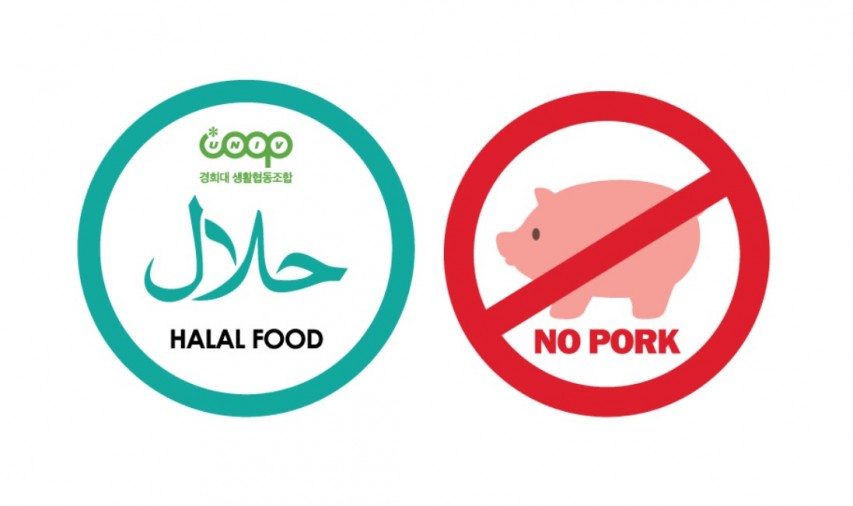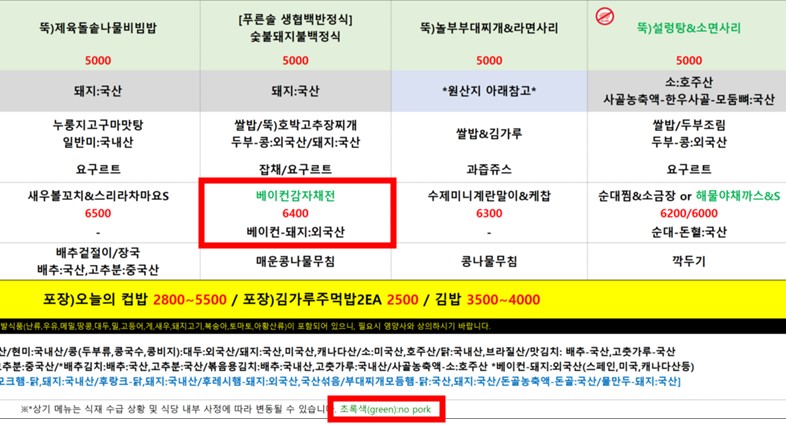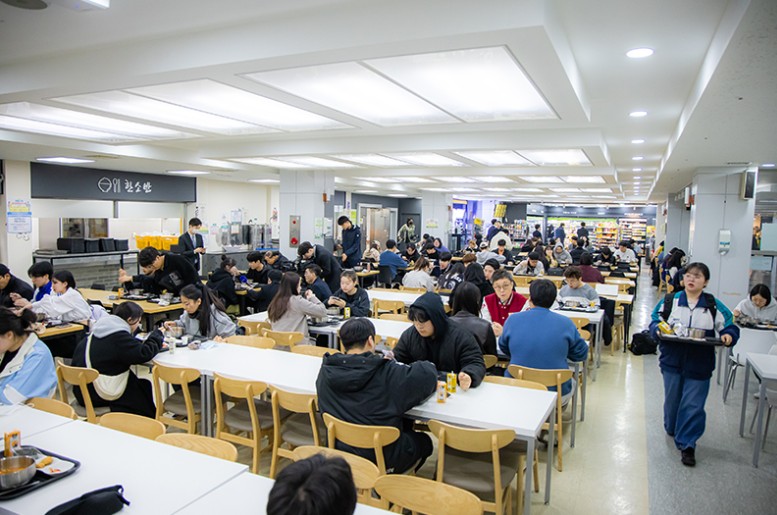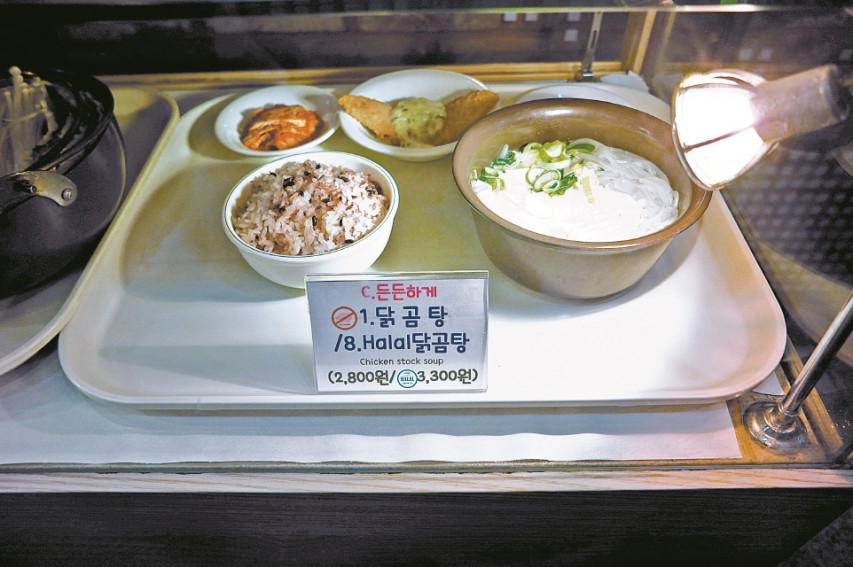[Campus] Cultural Diversity and the Right to Choose: KHU Faces Challenges in Campus Dining
[Related articles]In today’s globalized era, having a respectful view of students’ various food cultures is an important responsibility for universities. In particular, Kyung Hee University (KHU) faces growing demands for more inclusive dining options since it has the second-largest number of international students in Korea. With KHU Cooperatives taking over meal services at the Global Campus Student Center, there is growing interest in how the new cafeteria system will meet the diverse expectations of students.
A Growing International Community with Diverse Diets
The number of international students in South Korea is increasing annually. According to the Ministry of Education, the number of international students in South Korea’s institutions of higher education has increased from 16,823 in 2004 to 181,842 in 2023.
KHU has the second largest number of international students in South Korea, with 6,395 foreign students enrolled as of 2024. Additionally, the University maintains sisterhood relationships with 595 universities across 84 countries and hosts over 2,000 students annually in various international programs. This diverse student population brings a variety of dietary requirements, including religious, ethical, and health-related restrictions.
Muslim students, for example, can only consume halal food, which refers to food permitted under Islamic law, Sharia. In the case of meat, pork is strictly prohibited, and other types of meat are allowed only if they are slaughtered according to Sharia.
Beyond religious reasons, people are increasingly adopting a vegetarian diet for various reasons, including health concerns, personal beliefs about climate change, and animal welfare. For instance, livestock farming, especially cattle production, is a significant contributor to environmental pollution, including deforestation and greenhouse gas emissions.
Additionally, concerns over the ethical treatment of animals in industrial farming practices are prompting individuals to seek plant-based alternatives. According to the Good Food Institute, a non-governmental organization focused on food sustainability, sales of plant-based foods in 13 European countries, including Germany and France, reached 5.8 billion euros in 2023. This represents a 21% increase since 2020.
Limited Options at KHU’s Campus Cafeterias
Despite its diverse student body, KHU’s campus meal options remain largely meat-based. For example, the menu at the Cheongwoon Building student cafeteria in September 2024 included beef, pork, chicken, or seafood in every dish, leaving vegans with only a salad pasta option.
Although the menu at the Pureunsol Building student cafeteria is somewhat better than that of the Cheongwoon Building, it still leaves much to be desired. There are vegetarian options such as cold noodles and rice balls, but these are mainly offered as side dishes rather than full vegetarian meals.
The halal chicken soup sold in 2016
photo: Sungdaeshinmun (skkuw.com)
KHU previously offered halal meals at the Cheongwoon Building student cafeteria in 2016. In response to a request from the Global Center, the University collaborated with Muslim international students to introduce halal dishes within the cafeteria’s operational limits. However, due to difficulties in sourcing ingredients and maintaining halal-certified cooking methods, the service was eventually discontinued.
The primary challenges included the procurement of halal ingredients and adhering to the strict preparation process. Halal food is not simply about excluding pork. Muslims can only consume meat that has been slaughtered according to Sharia, requiring the use of strictly permitted meats. Additionally, cooking utensils must be kept separate from those used for non-halal ingredients. Another challenge was the restriction on common seasonings such as soy sauce and mirin, which are classified as alcohol and therefore not permitted in halal cooking.
Kim Min-hwa, Secretary General of KHU Cooperatives, explained, “When we provided halal food in the past, the limited demand, combined with the challenges of ingredient sourcing, strict cooking procedures, and pricing, made it unsustainable. Unfortunately, we had no choice but to discontinue it.”
Flaws in the Cafeteria’s Labeling System
Since 2016, a labeling system has been in place, allowing students to check whether the food contains ingredients they cannot consume. However, inconsistent labeling has led to confusion. Both cafeterias of Cheongwoon Building and Pureunsol Building use green text and symbols to indicate pork-free dishes. But, this system was not consistently applied. In the second week of January 2025, the Cheongwoon Building menu included only the symbol without the green text. Another issue is that the symbol is very small, making it difficult to recognize at a glance.

Symbols used in KHU's cafeterias to indicate halal meals and pork-free meals
photo: KHU Cooperatives (coop.khu.ac.kr)

Labeling error in Pureunsol Building cafeteria
photo: KHU Cooperatives (coop.khu.ac.kr)
Additionally, at Pureunsol Building, some dishes were marked with green text but lacked the symbol. Some dishes were labeled incorrectly, such as a bacon potato pancake being marked as pork-free. Kim acknowledged these issues, saying, "This was an error, and we will correct it. I will also ask the nutritionists to ensure that such mistakes do not occur in the future."
Challenges in Expanding Meal Options
The main obstacle to expanding vegetarian and halal meal options is low demand. Kim explained, “There are always many requests for specific meals in the cafeteria. However, when these meals are actually provided, the number of students who order them is often much lower than expected, resulting in financial losses. While the cooperative is not a profit-driven organization, it must maintain a certain level of financial stability to sustain itself. We hope students understand that we cannot continuously operate at a loss.”
However, the KHU Cooperatives also expressed openness to reintroducing past meal options if demand is sustained. Kim stated, “If an organized student group, such as a student association or a club, can ensure stable demand, we would be open to discussions. We are willing to consider bringing back initiatives like the pre-pandemic weekly vegetarian menu on Wednesdays or the salad bar. However, this is not something the cooperative can handle alone. Student participation is essential.”
The Future of Dining at KHU
With the KHU Cooperatives taking charge of operating the cafeteria at the Global Campus Student Center, attention is focused on whether the new meal system will meet student demands. Yet, as the menu structure mirrors that of the Cheongwoon Building cafeteria, major changes such as the introduction of new vegetarian or halal options seems unlikely.
However, Kim assured that efforts are being made to provide stable meal services that meet student expectations. He added, “Students tend to view the cooperative as just another vendor, but in reality, it is an organization created by and for the KHU community. For the new meal system to be successfully established, support from university members, especially student participation through cooperative membership, is crucial. We hope that, like the Seoul Campus, the Global Campus will also develop into a community where faculty, students, and staff actively participate.”

Pureunsol Building student cafeteria
photo: KHU (khu.ac.kr)
Food is more than just consumption; it is a crucial element in shaping culture and identity. As a globalized university with a large international student population, KHU's inability to provide equal access to cafeteria meals for all students raises important challenges. If student demand is strong and well-organized, initiatives such as vegetarian and halal meal options could become a reality, fostering a dining environment that better reflects KHU’s diverse campus community.
There are no registered comments.
- 1
- 2
- 3
- 4
I agree to the collection of personal information.


